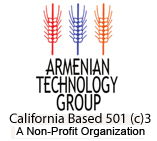October 4, 2003
(The Fresno Bee)
By Robert Rodriguez
Tavit Lokian, Armenia’s minister of agriculture, toured the central San Joaquin Valley on Friday, learning about the latest in farming and laying the groundwork for creating an animal testing laboratory in Armenia.
Lokian arrived Thursday, meeting with raisin, grape and tree fruit farmers. He also visited the agriculture department at California State University, Fresno, as well as OK Produce in downtown Fresno.
Lokian said he was especially interested in seeing California’s Animal Health & Food Safety Laboratory System, a network of labs that tests livestock animals for, among other things, disease. The state has a central lab in Davis and four branch labs in Fresno, Tulare, Turlock and San Bernardino. Lokian toured the Tulare facility Friday afternoon. Armenia doesn’t have its own testing laboratory, and that concerns Lokian.
“A lot of animal and vegetable products pass through our borders from Iran in the south to Russia and Europe in the north,” Lokian said. “And we need to protect what we produce.”
Armenia’s agricultural production includes grains, potatoes, tree fruit, grapes and livestock. Lokian said Armenia is working harder at producing higher-quality products and does not want to jeopardize those efforts.
“We will never be able to produce on such a large quantity as you do in California,” Lokian said. “But we are working on doing a better job of competing in the market.”
During his visit, Lokian met with members of the Armenian Technology Group — a Fresno organization that provides support for Armenian farmers.
The group is working with Lokian to find the resources for a diagnostic lab, including asking the federal government for help.
Varoujan Der Simonian, executive director of the group, estimates a diagnostic lab will cost about $1.5 million to $2 million to build and an estimated $200,000 to $500,000 to operate annually.
Simonian hopes that the facility will not only help protect Armenia’s food supply but also pave the way for the country’s entry into the World Trade Organization. “It is difficult to become part of the WTO without something like this,” Simonian said.
Identifying and controlling outbreaks of plant and animal diseases is a major issue in international trade.
Dr. Robert Moeller, veterinarian pathologist for the lab in Tulare, agreed, saying a diagnostic lab is critical to stopping the spread of highly infectious diseases, such as foot-and-mouth.
“With the rapid movement of people and animals that we have today, a disease could spread quite rapidly,” Moeller said. “And Armenia is located in a gateway to Europe. It’s in a critical area where early detection of disease is important.”
For more information about how you can help Armenia’s farmers, contact the ATG office at (559) 224-1000 or by e-mail (info@atgusa.org). Tax-deductible donations can be sent to ATG; 1300 E. Shaw, Suite 149; P.O.Box 5969; Fresno, CA 93755-5969.
You may also donate to ATG online.

Follow Us